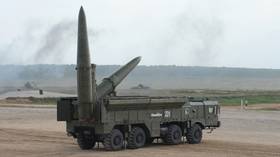Oil prices spike as US slaps sanctions on Russian crude exports

Global oil prices jumped on Friday after the US began to enforce the G7 price cap restrictions on Russian crude exports, exacerbating concerns over global supply, market data showed.
International benchmark Brent crude futures for December delivery surged over 4%, to trade at $89.46 per barrel around 15:40 GMT. US benchmark WTI crude was also up over 4% at $86.34 per barrel.
Market experts link the surge with Washington’s new sanctions imposed on Thursday against two owners of tankers carrying Russian oil for allegedly delivering crude priced above the G7 oil price cap of $60-per-barrel. The measure has been in force since December 5, 2022.
The US Department of the Treasury’s Office of Foreign Assets Control (OFAC) discovered that the YasaGolden Bosphorus tanker, owned by Türkiye-based Ice Pearl Navigation Corp, carried Russian oil priced above $80 a barrel after the price cap mechanism came into force. The SCF Primorye, owned by UAE-based Lumber Marine SA, was accused of a similar violation. The US placed the ships’ owners under sanctions and identified the vessels themselves as blocked property.
Analysts also note the effect on oil prices from the escalation of hostilities between Palestinian militant group Hamas, which controls much of Gaza, and the Israeli Defense Forces. While the initial surge in prices caused by the renewed conflict had subsided by mid-week, there are fears the situation may worsen after Iranian Foreign Minister Hossein Amir-Abdollahian warned on Thursday that Tehran could enter the conflict if the Israeli blockade of Gaza continued.
The situation ignited fears that the Israeli-Hamas war drawing in Iran could destabilize the Middle East, which accounts for more than one third of global seaborne trade, and exacerbate the existing oil supply deficit. According to Bloomberg Economics analysts, this could send crude prices to $150 a barrel.
For more stories on economy & finance visit RT's business section












